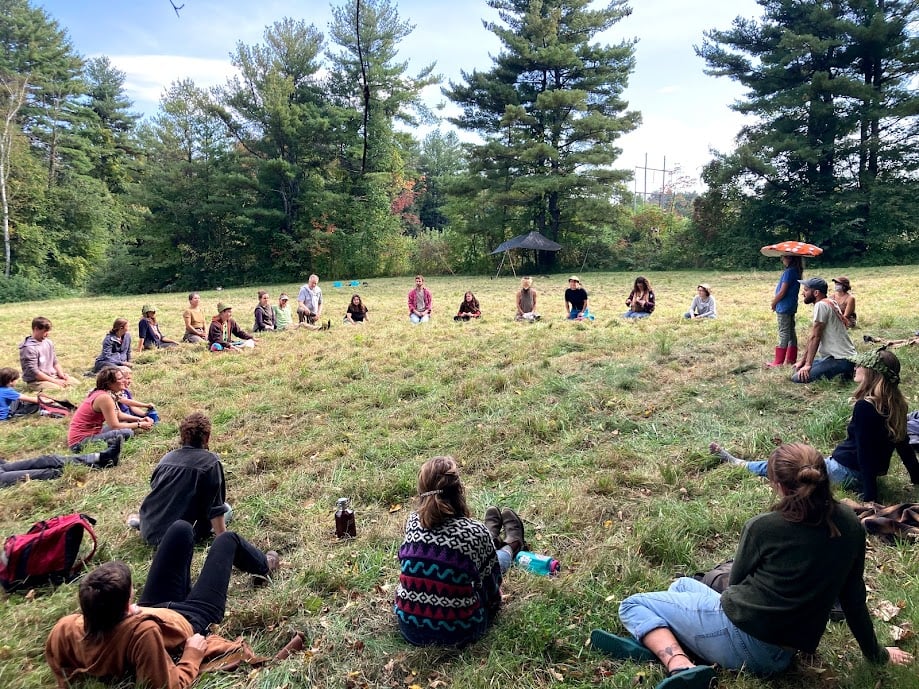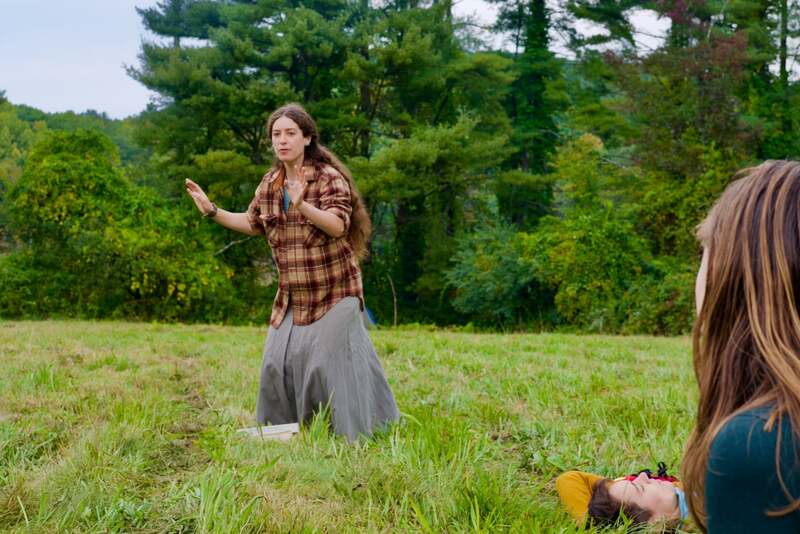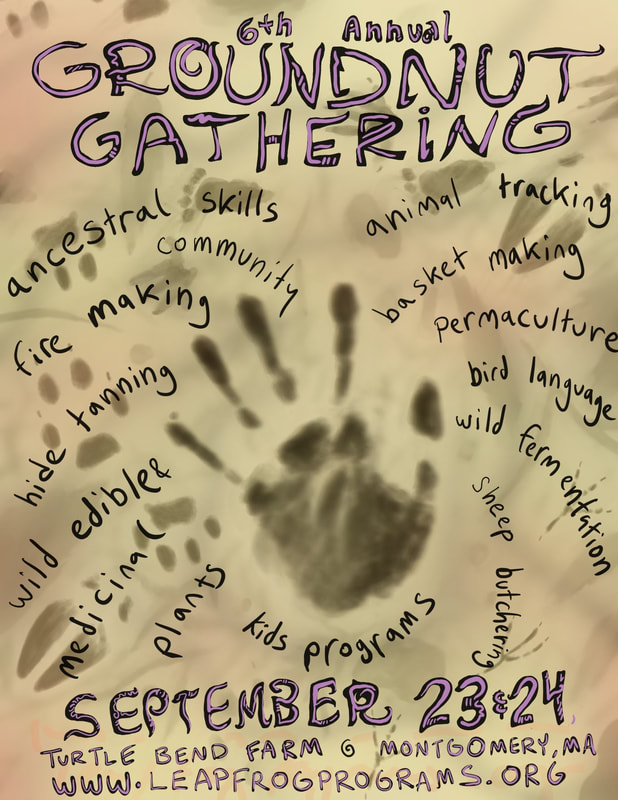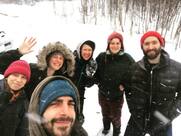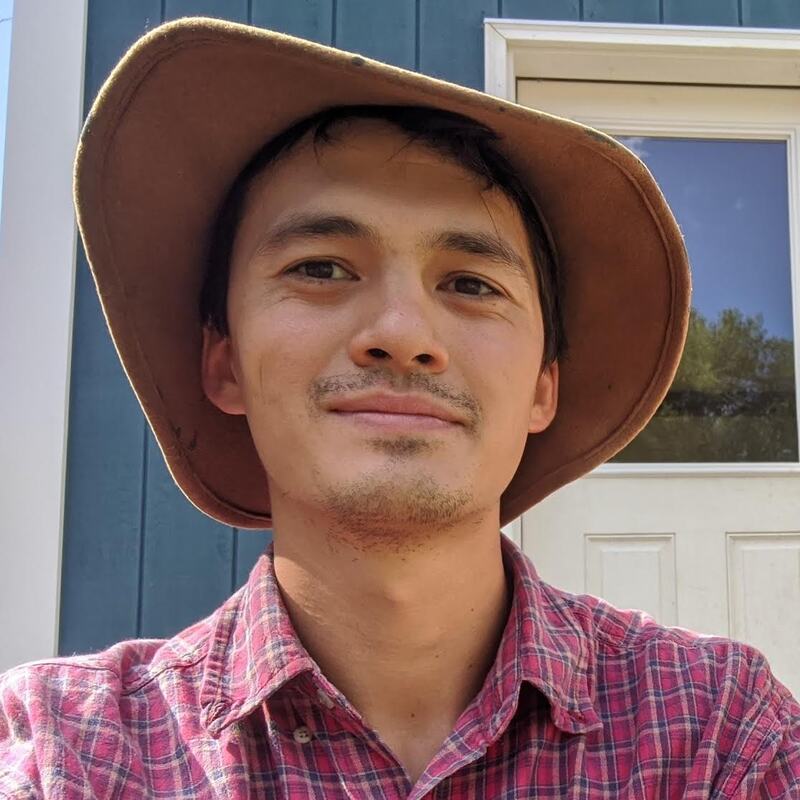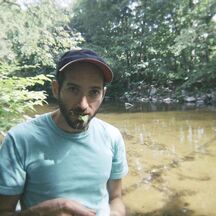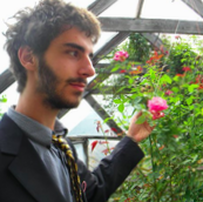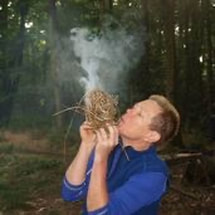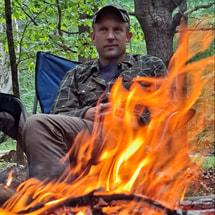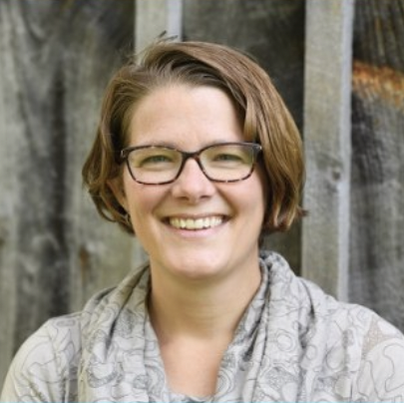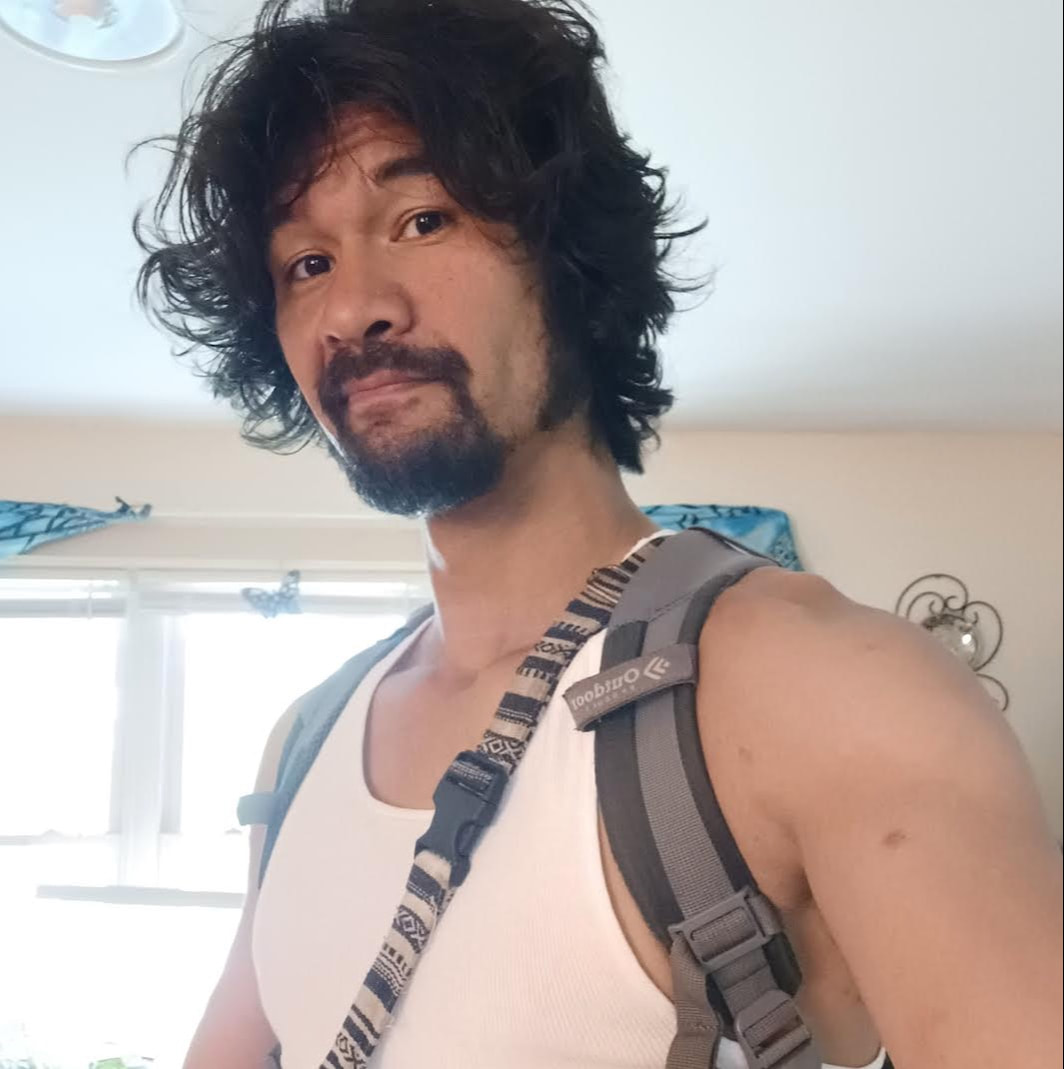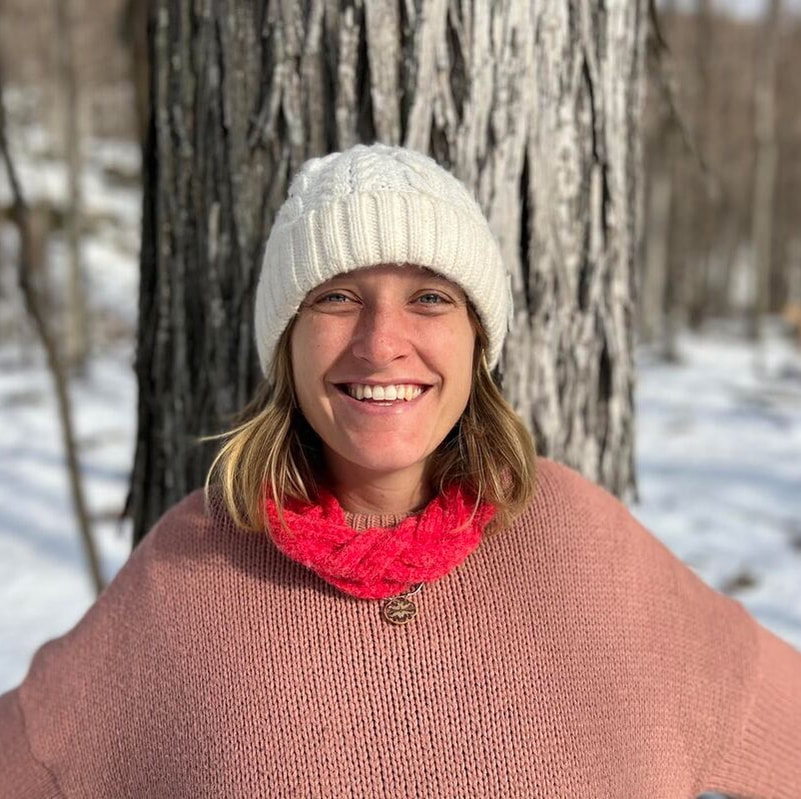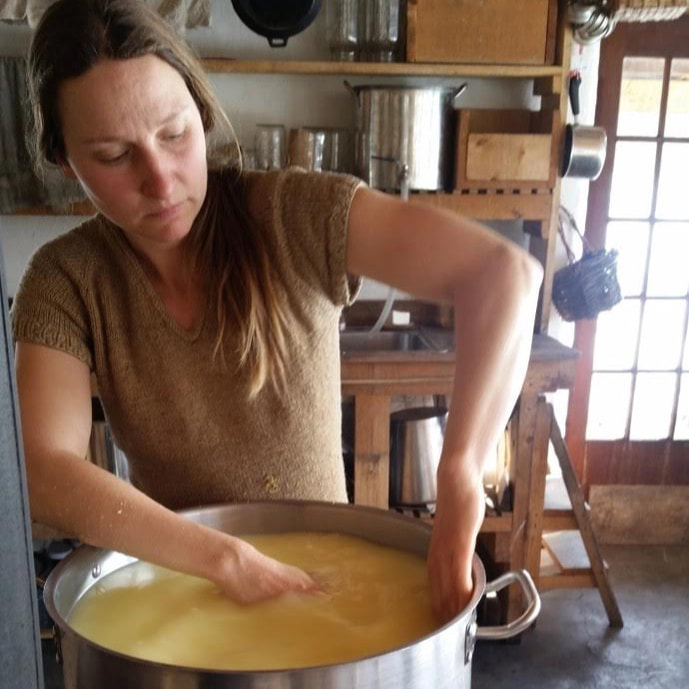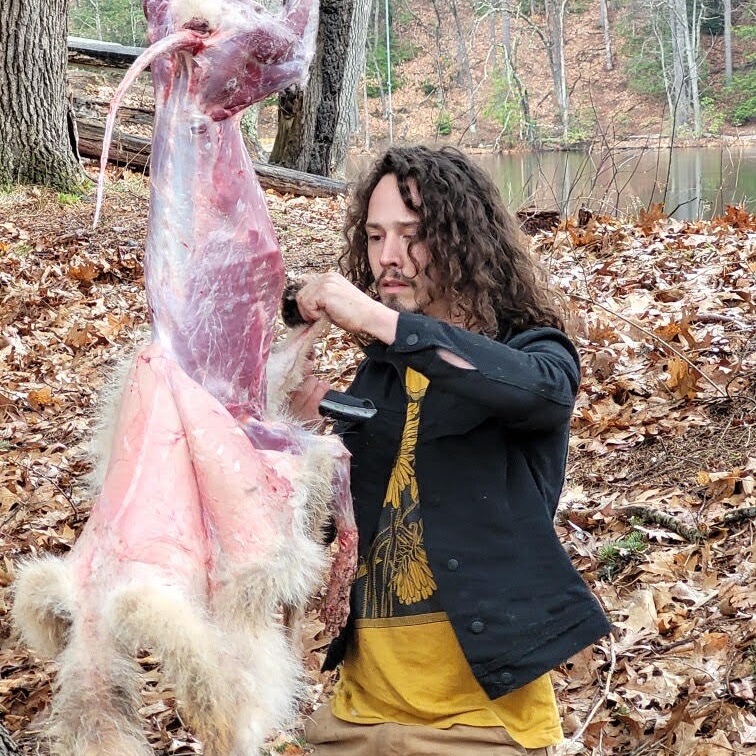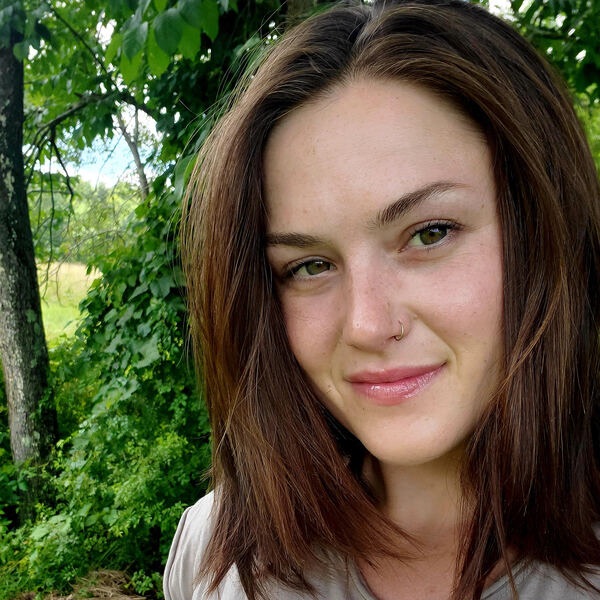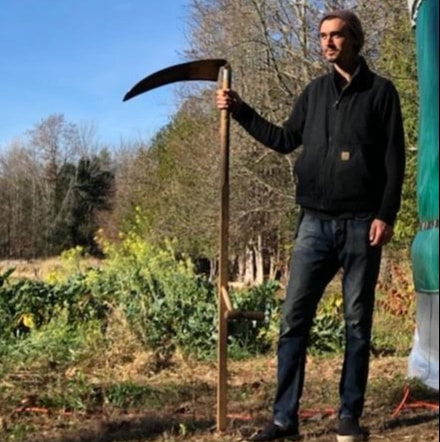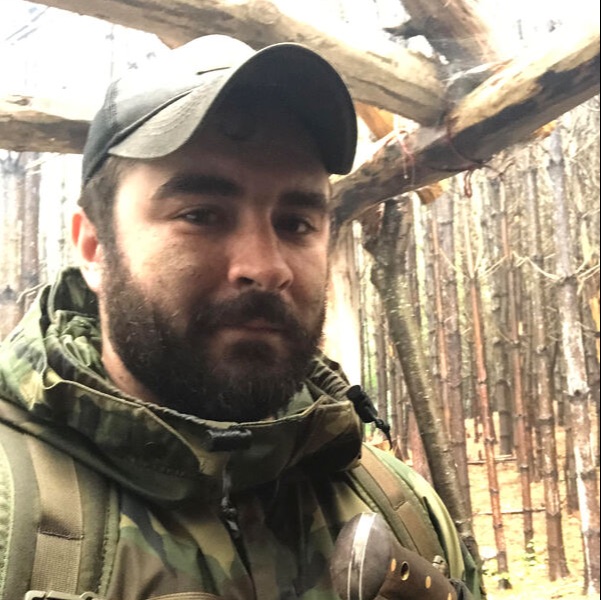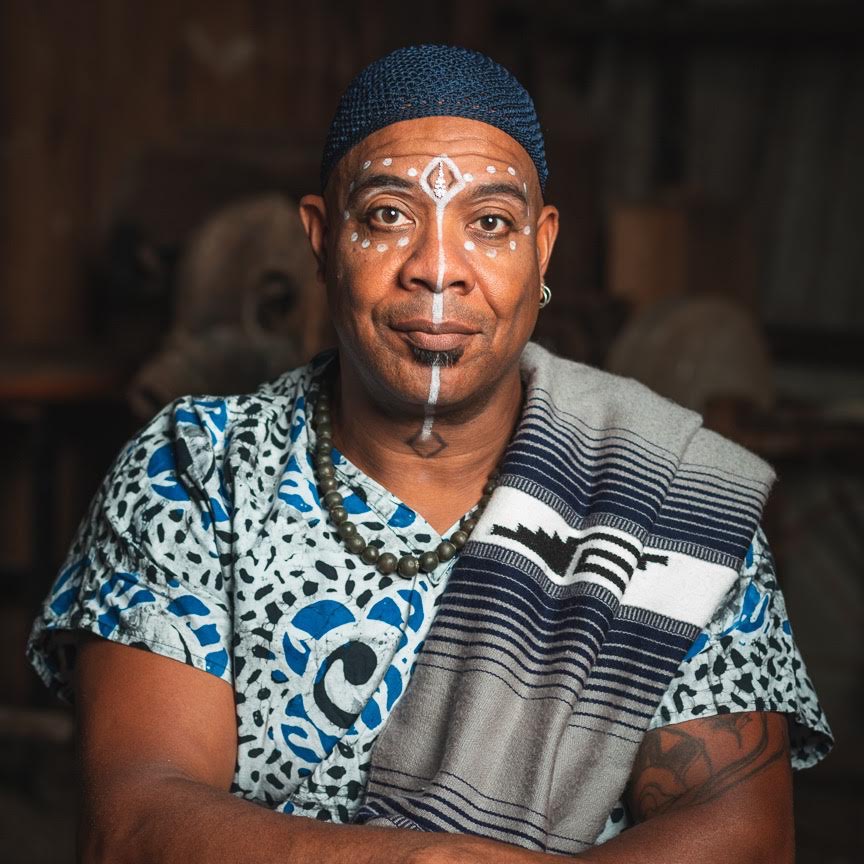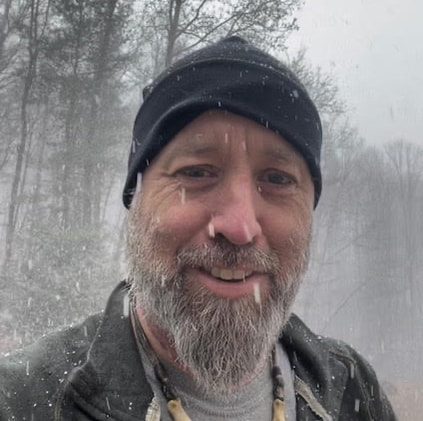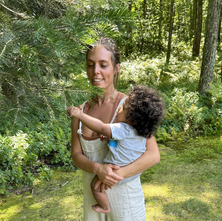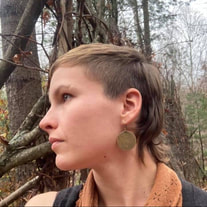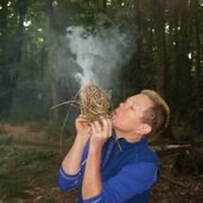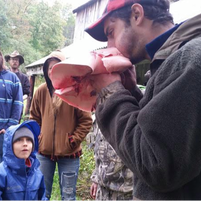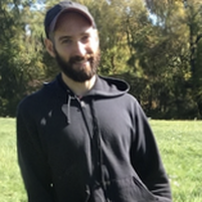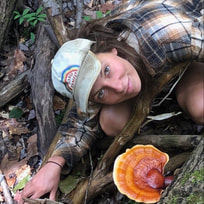The 6th Annual Groundnut
Western MA Earth Skills Gathering in Montgomery, MA, Oct. 5-6, '24
|
Join us for a regional Earth living skills gathering this fall in the beautiful woods and meadows of Montgomery MA! For our 6th gathering, we're once again grateful for the chance to bring together inspired teachers and enthusiasts from around the area to connect with each other and the land as we learn and share timeless skills. Practiced by peoples on all continents, animal tracking, hide tanning, friction fires, storytelling and other skills connect us to each other, the land, and our origins.
The gathering runs Saturday morning, 9/23, through Sunday afternoon, 9/24. Camping is available and encouraged. There will be 5 workshop blocks, time to work on and share personal projects, trade items, potluck meals and community building. Proceeds support the planting and maintenance of public food forests across Western MA through Help Yourself Edibles as well as Nipmuc Nation Tribal Council. |
TICKETS ON SALE BEGINNING IN AUGUST
1 Day Attendance (SAT 9/23) FULL
(ONE DAY ATTENDANCE: SATURDAY, 9/23/2023)
Leapfrog Programs strongly believes in the importance of making our events affordable and accessible for all. Please use the sliding scale below to select a price that best works for you and or your family’s financial situation and needs.
Payments towards the higher end allow us to offer lower cost tuition to people and families with less resources. After operating costs, proceeds from this event supports the planting and maintenance of public access orchards in communities across Western MA. We thank you for your support.
** Kids under 6 are free! Kids over 6 will need their own ticket and will have full access to the kids programming.**
High
- I am in a comfortable position where I can easily fulfill all my basic needs.
- Debt I may have does not prevent me from meeting my basic needs.
- I either own my home or property, or I rent a higher-end property.
- I own or lease a car.
- I am employed or do not need to work to meet my needs.
- I have regular access to healthcare.
- I have access to financial savings.
- I have disposable income.
- I can always afford to buy new items.
- I can afford to take an annual vacation or take time off without financial strain.
- I may benefit from systemic privilege based on my race, ethnicity, or other cultural factors, and do not routinely experience racism or prejudice.
Middle
- I may experience some stress about meeting my basic needs but generally succeed in fulfilling them.
- I may have some debt, but it doesn't prevent me from meeting my basic needs.
- I own or lease a car.
- I am employed.
- I have access to healthcare.
- I have access to some financial savings.
- I have some disposable income.
- I can afford to purchase some new items and also shop at thrift stores.
- I can go on a vacation annually or every few years without financial burden.
Low
- I experience stress about meeting basic needs, and often fail to meet them have debt, which sometimes prevents me from meeting my basic needs.
- I rent lower-end properties or have unstable housing.
- I do not have a car or have limited access to one, and I struggle to afford gas.
- I am unemployed or underemployed.
- I qualify for government assistance, including food stamps and healthcare.
- I have no access to savings.
- I have little to no disposable income.
- I rarely buy new items due to financial constraints.
- I cannot afford a vacation or take time off without facing financial burden.
- I may lack systemic privilege based on my race, ethnicity, or other cultural factors, and may instead face racial prejudice or hardships.
1 Day Attendance (SUN 9/24)
(ONE DAY ATTENDANCE: SUNDAY, 9/24/2023)
Leapfrog Programs strongly believes in the importance of making our events affordable and accessible for all. Please use the sliding scale below to select a price that best works for you and or your family’s financial situation and needs.
Payments towards the higher end allow us to offer lower cost tuition to people and families with less resources. After operating costs, proceeds from this event supports the planting and maintenance of public access orchards in communities across Western MA. We thank you for your support.
** Kids under 6 are free! Kids over 6 will need their own ticket and will have full access to the kids programming.**
High
- I am in a comfortable position where I can easily fulfill all my basic needs.
- Debt I may have does not prevent me from meeting my basic needs.
- I either own my home or property, or I rent a higher-end property.
- I own or lease a car.
- I am employed or do not need to work to meet my needs.
- I have regular access to healthcare.
- I have access to financial savings.
- I have disposable income.
- I can always afford to buy new items.
- I can afford to take an annual vacation or take time off without financial strain.
- I may benefit from systemic privilege based on my race, ethnicity, or other cultural factors, and do not routinely experience racism or prejudice.
Middle
- I may experience some stress about meeting my basic needs but generally succeed in fulfilling them.
- I may have some debt, but it doesn't prevent me from meeting my basic needs.
- I own or lease a car.
- I am employed.
- I have access to healthcare.
- I have access to some financial savings.
- I have some disposable income.
- I can afford to purchase some new items and also shop at thrift stores.
- I can go on a vacation annually or every few years without financial burden.
Low
- I experience stress about meeting basic needs, and often fail to meet them have debt, which sometimes prevents me from meeting my basic needs.
- I rent lower-end properties or have unstable housing.
- I do not have a car or have limited access to one, and I struggle to afford gas.
- I am unemployed or underemployed.
- I qualify for government assistance, including food stamps and healthcare.
- I have no access to savings.
- I have little to no disposable income.
- I rarely buy new items due to financial constraints.
- I cannot afford a vacation or take time off without facing financial burden.
- I may lack systemic privilege based on my race, ethnicity, or other cultural factors, and may instead face racial prejudice or hardships.
Full Weekend Attendance!
(FULL WEEKEND ATTENDANCE: SATURDAY & SUNDAY, 9/23-24/2023)
Leapfrog Programs strongly believes in the importance of making our events affordable and accessible for all. Please use the sliding scale below to select a price that best works for you and or your family’s financial situation and needs.
Payments towards the higher end allow us to offer lower cost tuition to people and families with less resources. After operating costs, proceeds from this event supports the planting and maintenance of public access orchards in communities across Western MA. We thank you for your support.
** Kids under 6 are free! Kids over 6 will need their own ticket and will have full access to the kids programming.**
High
- I am in a comfortable position where I can easily fulfill all my basic needs.
- Debt I may have does not prevent me from meeting my basic needs.
- I either own my home or property, or I rent a higher-end property.
- I own or lease a car.
- I am employed or do not need to work to meet my needs.
- I have regular access to healthcare.
- I have access to financial savings.
- I have disposable income.
- I can always afford to buy new items.
- I can afford to take an annual vacation or take time off without financial strain.
- I may benefit from systemic privilege based on my race, ethnicity, or other cultural factors, and do not routinely experience racism or prejudice.
Middle
- I may experience some stress about meeting my basic needs but generally succeed in fulfilling them.
- I may have some debt, but it doesn't prevent me from meeting my basic needs.
- I own or lease a car.
- I am employed.
- I have access to healthcare.
- I have access to some financial savings.
- I have some disposable income.
- I can afford to purchase some new items and also shop at thrift stores.
- I can go on a vacation annually or every few years without financial burden.
Low
- I experience stress about meeting basic needs, and often fail to meet them have debt, which sometimes prevents me from meeting my basic needs.
- I rent lower-end properties or have unstable housing.
- I do not have a car or have limited access to one, and I struggle to afford gas.
- I am unemployed or underemployed.
- I qualify for government assistance, including food stamps and healthcare.
- I have no access to savings.
- I have little to no disposable income.
- I rarely buy new items due to financial constraints.
- I cannot afford a vacation or take time off without facing financial burden.
- I may lack systemic privilege based on my race, ethnicity, or other cultural factors, and may instead face racial prejudice or hardships.
WORK TRADE OPEN AUGUST 2024!
|
The Groundnut Gathering is made possible with the help of its amazing Worktraders! Thank you for your interest in contributing your hands and heart to helping make this event happen! Please click here to fill out a work trade application. Space is limited. Applications deadline is 9/3. |
2024 Schedule COMING SOON
|
Friday:
⛺ Camping arrival: 4:00 **Arrival closes at 7:30 pm** |
Saturday:
Arrival/parking: 8:00-8:45 Opening Circle: 9:30 Block 1: 10-12:00
Lunch & Lamb Roast 12:00-1:30 Block 2: 1:30-3:15
Block 3: 3:30-5:00
Potluck Dinner 5:30 🔥 Fire, Music, Song Circle, and Story time! 6:00 🔭 Open Telescope: 8:00-9:30 Check out the planets! |
Sunday:
Potluck Breakfast 8:00-9:00 Arrival and Parking: 8:00-9:00 Opening Circle: 9:30 Block 1: 10-12:00
Lunch & Trade Blanket 12-1:30 Block 2: 1:30-3:30
Block 3: 3:35-5:00
Closing Circle: 5:15 |
Class Descriptions
Mushrooms are mysterious, so are people--join us in exploration of how we get to know fungi and each other through games, observation, movement, questions, reflections, and poetry. All levels of mushroom and social foragers are welcome to participate :)
Mallets, Wedges, and Stakes: Knives in Action - Deborah Chamberlain
In this class we will learn how to safely use knives to create simple tools that can be used in and around camp: mallets, wedges, and stakes. We will also build knife skills by practicing multiple notches on a Try Stick. There will be a limited number of bushcraft knives for sale under $20.00 in this workshop. If you'd like a knife beforehand, we recommend a Morakniv.
Complete Sheep Butchering - Felix Lufkin
Learn how to skin, dress, quarter and butcher sheep! In these workshops, we'll learn about butchering, charcuterie and anatomy as we transform animals into food. The slaughter will be part of this experience, and will be optional - though encouraged. All parts of this animal will be used including organ meats, bones and blood. We'll also, learn to use the sinew for string, hooves for glue how to undertake hide work. Roll up your sleeves and participate, or stand back at a comfortable distance and watch. All this will be done, of course, in the respectful context of interdependence.
Cordage Class - Charlie Ryan
Making cordage, or string out of fibrous plants, or animal parts, is a very ancient skill. Used in countless other tools and crafts, making quality thread from wild plants is the is a skill that is both a foundation of human survival, and a great way to get to know the species around you. In this class will explore different plants, and how to extract their fiber, and the techniques for making them into thread, as well as crafts that use cordage, such as weaving and nets.
Bittersweet Basketmaking - Anya Klepacki and Kokoro Bensonoff
Our surroundings are so lush this time of year! But what’s that vine that seems to be everywhere we look? In this workshop, we’ll learn a bit about Asiatic Bittersweet (a non-native aggressive/imbalanced vine), consider some history of how plants make their way around the globe, and learn to weave a simple bittersweet basket! Bring your own clippers and awl if you have them.
Nut Trees of the Northeast: How to gather and process - Elodie Eid
Have you ever wondered, "What are the staple crops of our region? Where can we find perennial fats and carbohydrates that can be stored for extensive periods of time?" Nut trees surround us on every street and in every forest and they are often overlooked. Join Elodie Eid and familiarize yourself with nuts that you can gather and process at home this fall. Learn basic ID, pro processing tips, and basic recipes. She also has a really fun nut cracker :) If encouraged, she will happily do some story telling around why nut trees are important to us and this land.
Introduction to the Art and Science of Tracking - Walker Korby
Delve into the deepest recesses of our shared humanity to remember an essential practice that reveals the connections between us and the other beings with whom we share this planet. We'll explore animal gaits and movement, learn some core practices, and begin to learn how to interpret the world through the senses of a tracker. Whether this is the beginning of your tracking journey or you are a life-long tracker, you're sure to come away with inspiration and insight!
Fire by Friction - Kai Pratt
Humans and fire have had a magnificent and interwoven relationship for years upon years. Learn the ways in which humans have co-evolved with fire and come away with a renewed sense of interconnetion. Walk in the footsteps of your ancestors by learning to use the ancient technology of the bow drill.
Lyme and Tick Borne illnesses - Bonnie Bloom
We will discuss prevention and protection and the details of what we are dealing with. What to
do with the tick and for the person if bitten to achieve the best plan for treatment and successful
treatment outcomes, using herbs and supplements as well as antibiotics effectively. There will
be time for questions.
Discover Fly Fishing - Ned Phillip Jones
Can you envision being connected with rivulets and streams? Would you like to be able to provide yourself with fresh, tasty trout dwelling in exuberant waters all over the world? In this session you'll learn core elements of fly fishing from a passionate teacher. We'll cover equipment, casting techniques, how to read the water, and how to prepare your catch for dinner. Together we'll begin rousing our primordial predator instincts via teachers like the heron and the mantis.
Wild Soda Making - Zoe Weizenbaum
Water, raw honey and edible flowers/herbs/fruit. These are the only three ingredients you need to create your own delicious, effervescent natural sodas. The process of fermentation that begins when the aforementioned three ingredients combine transforms the sugars in the honey into a not-too-sweet, probiotic alternative to classic sodas. Magic! Science! Both! First we will cover the basic formula and proportions for this ferment, after which you will have the opportunity to put the theory into practice. Experiment with the flowers, fruits and herbs of the season to create your own drink to take home. The class will conclude with a discussion of additional options for culture, sugar and flavor.
Hide Tanning - Graham Skorupa
Join me for a three day hide tanning journey where we will transform a raw squirrel hide into beautiful, supple and practical leather! You will learn how to skin and tan a hair on and off hide using the wet scrape brain-tan method and learn how to preserve it by smoking it. To tan the squirrel from start to finish you will need to join this intensive class that goes throughout the entire gathering. Let your senses come alive as you delve into this age old practice!
Wild Edibles Walk - Felix Lufkin
We will set out on a wild food and medicine walk where we will learn to ID, prepare and honor the bounty under our feet! Only recently has our relationship to wild food and medicine been snuffed out creating a devastating loss of connection between land and human. Reclaim the birthright that is yours, your biological need to be connected to the Earth as we meet and great more than a dozen species.
Bird Language Basics - Julie Kunz
In this workshop, you will learn the basic components of how to interpret bird sounds, their communication patterns and their behavior. This allows us to better understand what is happening in the landscape around us. We will take time to listen deeply through a bird sit and play a game to mimic the interconnectedness of the bird world.
The $0.00 Food Forest - Davis Wang
Ever feel like you’d love to plant a food forest, but can’t afford all the plants you want? Come learn from a nurseryman how to gain tremendous plant wealth without spending a cent. In this class we will take a plant list for an imaginary food forest, and strategize how to lay out a nursery bed in your garden to start everything from scratch—by way of seed starting, grafting, cuttings, layering, and division. Tips for where to source free plant material, how to graft onto wild trees, stratifying and protecting seeds, how to keep it all organized, and more! You will leave this class as a more self-sufficient plantsperson.
Tracking the Menstrual Cycle - Martha Hoffman Come learn how to track and support the menstrual cycle, as humans have been doing for generations. We will cover reproductive anatomy, basic hormones, methods of tracking, and holistic cycle support. We will close with an open conversation among all participants. Open to all bodies and ages!
Cheese Making - Kalyn Campbell
Kalyn Campbell is a homesteader in Central Vermont working to reduce her need for the industrial system by making and growing her own food and clothes. This includes all things dairy! She has 10+ years experience milking cows and goats and making cheese with the milk both commercially and on a home scale. She hopes to encourage others to join her on this journey towards self-reliance and healthy land stewardship. You can see more of what Kalyn does at The Handspun Cow Educational Homestead
Butter Making - Kalyn Campbell
Come learn how easy it is to make cultured butter. Take turns churning the butter and learn how to clean it. This class is taught by Kalyn Campbell is a homesteader in Central Vermont working to reduce her need for the industrial system by making and growing her own food and clothes. This includes all things dairy!
She has 10+ years experience milking cows and goats and making cheese with the milk both commercially and on a home scale.
Basket Weaving - Erica Martenson
Basket weaving is an ancient and beautiful skill. Come learn how to make a simple coil basket! We will work with a variety of materials and discuss the sequence of identifying, harvesting, and processing the fibers. Our hands love making beauty, and this is a wonderful way to do so!
Scythes & Sickles - Jack Stambaugh
Come join this participatory session with any level of skill or ability. During the class Jack will provide information about safety practices, tool maintenance, ergonomics, and technique, as well as facilitate discussion of the history and culture of scything in the northeast and abroad. There will be opportunities to practice with the tools and participants are encouraged to bring their own scythes, sickles, and sharpening equipment to use.
Autumnal Herbs: Plants that support the metal element and easeful transitions into Fall.
Come and learn about plants and rituals that nourish our bodies as we transition into Autumn. Autumn, or the season of the metal element, is a season of contraction and letting go as we prepare to go inwards for the winter. We will discuss rituals that support this important transition, and herbs and medicinal preparations that harness the virtues of the fall.
Salve Making
Salve making is an important homestead skill. These easy to craft, topical herbal medicines, based on oil and wax, are handy to have around for scrapes, sprains, strains, infections, cuts, splinters, burns and stings. In this class we will cover basic salve recipes and learn a handful of easily identifiable medicinal plants critical to the home first aid kit. Walk away with your very own salve!
Black Walnut Dyeing: Maggie Ranen
Black walnut hulls make the most beautiful brown dye. In this class, get prepared to get your hands dirty as we learn about this majestic tree, its many uses and prepare its hulls for dying using traditional methods. Bring any item of white cloth or clothing such as a t-shirt or socks.We will also crack some nuts for food!
Knots and Lashings: The Captain
Each knot has its strengths, weaknesses, and proper context. While knots can seem intimidating, with a little practice, it's easy to master a handful that can be very useful in different situations! Together, we'll get down and dirty with 5-6 knots that will come in handy throughout your life!
Ghosts of The Ice Age: Felix Lufkin
The more we learn about the living landscapes that we live in and support us, the more we appreciate our nonhuman relations and feel connected to them. As we get to know the wild plants and animals of the Northeast, we build a mental web of organisms and their many interconnections. By expanding on this knowledge from the perspective of deep time, we awaken to a staggering expanse of natural history stretching over many geologic ages - and how this contextualizes our own evolution and that of other modern day species. We'll learn about the relatively recently extinct large animals of our area, found here until the end of the last Ice Age, 12,000 years ago - and how they've left their impact on trees, plants, and other animals still alive today - ourselves included!
Buckskin Pouch Making: Little Dog
In this class we will learn several techniques to sew with sinew. Sinew is the fibrous tendon of an animal, in this case a deer. When it is dried it can be shredded and used as thread to sew with. In this 2 hour class we will cut and sew a small pouch out of Braintan Buckskin and stitch it together with sinew.
Japanese Knotweed Candle Making: Susanna Geilen
A perfect time of year to start making candles for the darker months ahead! These candles are fun to craft, enjoy and most of all make great and special gifts!
We will be making 100% beeswax candles with the help of Dogbane and Japanese Knotweed. The beginning of the class will be focused on making dogbane cordage, which will be used as the wick for the candles. We will continue by learing how to use Japanese Knotweed as molds for forming the candles. Throughout the class we will talk about both of these plants and how to identify them, harvest them, process them and use them for this craft. Everyone will go home with two candles!
Story Weaving: Djeli Celestia
Go beyond just memorizing stories and tap into the elements that connect all things in a creative healing journey. In this workshop we will be weaving words and movement.
Hatha/Vinyasa Flow Yoga Class: Sadie Ranen
Practice & play in a flow class guided with breathwork, strengthening & stretching. All levels welcome, everyone loved & accepted as they are. Class style & intensity will gauge off of where everyone is at. Class will be outside. Bring mat if that will be more comfortable for you.
Teacher Bios
|
Davis Wang: The $0.00 Food Forest
Davis Wang runs Humble Abode Nursery in Ashfield, MA. He grows thousands of plants every year and sends them out all over the country. His nursery focuses on hardy edible perennial plants for all layers of the food forest. Davis enjoys sharing his self-taught knowledge of plant propagation with others, so that they may turn some seeds and twigs into their own bountiful landscape. |
|
Dean Colpack: Mushroom Mysteries and Mushroom Walk
Dean moved to Western MA when he was eighteen and soon fell in love with wild nature. He has worked as a nature educator in public elementary schools, has taught holistic, ethical butchering with gratitude to adults, and is a prison abolitionist who co-founded a local bail fund. He is a social worker who is obsessed by mushrooms, and tries to spread this obsession any way he can. |
|
Felix Lufkin: Wild Edible Plants, Complete Sheep Butchering, Ghosts of the Ice Age
Felix works with K-12, college and adult students at a number of programs in the Valley teaching nature awareness and homestead skills, in programs at public, private and home schools, public workshops and organizations including Mass Audubon, Wolf Tree Programs, the Vermont Wilderness School, and Earthwork Programs. He has lead programs at NorthStar Teen Center, Four Rivers Charter School, the Paulo Friere Social Justice Charter School, and taught wild edible plants and earth living skills classes at UMass Amherst and Hampshire College. He also directs Help Yourself, inc and Leapfrog Programs. |
|
Deborah Chamberlain: Mallets, Wedges, and Stakes: Knives in Action
Deborah's career in education started with the Hurricane Island Outward Bound School leading 30 day river trips with youth at risk some 30 years ago. She was lucky enough to work and travel from the Florida swamps to the hills of Wales and the streets of NYC. Deborah studied bushcraft in the UK with West Yorkshire Bushcraft, Michael Armstrong as lead instructor, in the US at the Tracker School and Mountainsong Expeditions. She also studied at the Blazing Star Herbal school with Gail Ulrich. I am so happy to be bringing my skills in progress to the Groundnut Gathering! |
|
Martha Hoffman: Tracking the Menstrual Cycle
Martha is a trained fertility awareness educator, full-spectrum doula, and massage therapist. They have a decade of experience in outdoor education, leading extended expeditions in Maine and Ohio, teaching wilderness first aid, and joyfully joining Leapfrog Programs Forest Afterschool staff. Martha's ancestors lived in the Outer Hebrides, Sweden, Appalachia, and Utah, leading her to now call the Connecticut River Valley home. Martha prioritizes consent, feedback, and curiosity in everything they do, and can't wait for GNG '23! |
|
Walker Korby: Introduction to the Art and Science of Tracking
Walker began his tracking journey in the late 80's as a Boy Scout in Central NJ. In high school he discovered the Wilderness Awareness School in his hometown and realized that his life path was going to be centered around reconnecting people with the rest of the natural world. He studied and taught with Wilderness Awareness School as well as The Tracker school, and Vermont Wilderness School. He's been an instructor and facilitator for the Art Of Mentoring programs across the country as well as in Europe for over 20 years, and and adjunct instructor in the Human Ecology program at Greenfield Community College. He obtained a Masters in Geography at UMass and currently runs a successful land stewardship company out of Montague MA. |
|
Anya Klepacki: Experimental Basketry
Anya has a background in environmental science and has been a native plant landscaper for several years. They experiment with primarily invasive plants like bittersweet, glossy buckthorn, autumn olive, hedge bindweed, and more to reopen space. She likes to try to zoom out to big picture contexts to help self-locate and recover meaning today. |
|
Kai Pratt: Friction Fire
Kai is a longtime western MA resident with a deep love of the natural world. He has taught permaculture, farming, ancestral skills, and more to kids and adults for the last decade. He currently works as an instructor with Wolf Tree programs; operates a small farmstead at his home in Warwick, MA; and teaches carving, hide tanning, and tracking when he can. |
|
Julie Kunz: Bird Language Basics
Julie Kunz (She/they): Julie Kunz grew up in New York City, but they have many fond memories of roaming fields and mushroom hunting in the forests of Switzerland, where their family is from. With a background in education, wilderness skills, and somatic awareness, Julie has mentored adults and children of all ages for the past twelve years, most recently directing a forest kindergarten at Flying Deer Nature Center (Chatham, NY). They hold a degree in Early Childhood Education from CUNY Hunter College and lives in Egremont with their 8 year old son. Julie loves rock climbing, paddling, forest wanders, ceremony and somatic practices. |
|
Bonnie Bloom - Lyme and Tick Borne illnesses
Bonnie is a clinical herbalist and has been working with plant medicine for twenty five years, Working as staff herbalist for Sojourns Community Health Clinic in Vermont for 15 years and the owner of Blue Crow Botanicals, local organic herbal extract company and farm. She has a clinical herbal practice in Gill, MA. |
|
Zoe Weizenbaum: Wild Soda Making
Zoe manages a small diversified farmstead in Amherst, MA. Here she tends to a variety of ferments, a rowdy herd of goats as well as a large permaculture garden. In this role she also delights in befriending all flavors of bacteria, yeast and fungus to create delicious cheeses, drinks, breads and krauts. Spend enough time with this farmer and she will inevitably offer you a spoonful, slice or sip of something wonderful and/or strange. |
|
Charlie Ryan: Cordage Class
Charlie grew up in Western Massachusetts and has spent a lot of his life immersed in Earth skills from different parts of the USA and the world. He has a lot of experience doing primitive skills, ecology and permaculture. "It's in me to teach what I know, to those open to learning the ways of building a greater understanding of life and how to be happy and healthy." |
|
Elodie Eid: Nut Trees of the Northeast: How to gather and process
Elodie has been working with nut trees since 2016, and has been in relationship with them at the nursery, in the orchard, and in the forest. Her passion in tree crops has taken her into the realm of agroforestry, but her first love, harvesting from wild hickory trees, still remains at the core of her inspiration. |
|
Kayln Campbell: Cheese Making and Butter Making
Kalyn Campbell is a homesteader in Central Vermont working to reduce her need for the industrial system by making and growing her own food and clothes. This includes all things dairy! She has 10+ years experience milking cows and goats and making cheese with the milk both commercially and on a home scale. She hopes to encourage others to join her on this journey towards self-reliance and healthy land stewardship. Visit www.thehandspuncow.wordpress.com to see more. |
|
Graham Skorupa: Hide Tanning
Graham is a hide tanner and nature enthusiast located in Great Falls. He looks to primitive skills as his source of inspiration and hopes to bring others closer to their feral side. He is passionate for the alchemy of this process, selecting his tanning materials with care only from natural sources, and his hides from roadkill or home slaughter. He began learning brain tan methods four years ago while living on a permaculture homestead. Over the years he has developed his own bark/veg tanning procedure for hides with or without hair. |
|
Erica Martenson: Basket Weaving
Erica grew up in a nature focused community, which allowed her to explore her passions of basketry, singing, fire making, foraging, and much more. She lives in a tiny house with her partner on Brook's Bend Farm, where she runs nature programs for girls through Wolftree Programs. She has 3 beautiful cows, a happy flock of chickens, and bees. |
|
Jack Stambaugh: Scythes & Sickles
Jack has been using scythes and sickles since 2016 when they were a student in UMass Amherst's Sustainable Food and Farming Program. They have a passion for social change and earth-based skills, and focused their academic work on permaculture and community education. Since graduating in 2019 Jack has lived on homesteads in Massachusetts, New Hampshire, and Maine, and has worked in agricultural and horticultural fields. They are a board member with the Permaculture Association of the Northeast, where they help facilitate permaculture education and resource sharing at a regional scale. |
|
Sean Armstrong: Knots and Lashings
Sean has their wfr training, wfa training as well as a basic cpr/first aid course. They have spent a few years out west doing outdoor skills in the desert that revolved around technical skills as well as survival based knowledge. Their passion has has been learning and teaching bushcraft/ survival skills since they were a child and have used that time to learn and practice as much as they could. |
|
Djeli Celestia- Storyweaving
Djeli (pronounced: Jelly), a brown-skinned descendant of enslaved Africans and indigenous Americans, is a story weaver who helps transform overwhelm to overjoy. Ki uses oral and written traditions, including poetry, to create an atmosphere of curiosity and dialogue, even around difficult topics. Ki helps others breathe life into their own stories as part of a healing process by speaking from the heart. |
|
Littledog (AKA Aaron Foster): Buckskin Pouch Making
Littledog has been learning and teaching outdoor skills for 30 years. His background in art and design has helped him pursue his varied interests in Carpentry, sewing, gardening and homesteading. He first learned how to braintan over 25 years ago. Over the years he has developed techniques to improve his leather tanning and is interested in teaching his techniques to others. He learned his sewing skills from his mother, who taught him to sew by hand and machine when he was a young boy. As his interests grew in historical and “primitive” skills he applied these interests to his craftwork. Littledog makes everything from modern clothing sewn on industrial sewing machines, to hand-sewn leather work. Littledog lives in Western Massachusetts with his Wife and Son on a 3 acre homestead in a house he built himself (with lots and lots of help). He works as a Handyman/Carpenter. When he isn’t designing, building, sewing and crafting he is fishing, hunting, foraging and occasionally sleeping! |
|
Sadie Ranen: Hatha/Vinyasa Flow Yoga Class
Sadie completed her first 200hr YAC Hatha teacher training in 2018 & her second 200hr YAC Vinyasa teacher training in 2023. Sadie has experienced that the practice of yoga can develop one’s ability to be grounded & present, develop greater resiliency & experience life with a felt greater ease. Knowing that all beings experience an inexplicable varying depth in this human experience, Sadie is interested in ways that support living life with authenticity, sensitivity, strength & love. Sadie believes we as humans are nature, not separate from, & that the practice of yoga can grow the awareness of our intrinsic connection to all living things. |
Frequently Asked Questions
What are the dates of the 2024 gathering?
Oct 5-6
Can children and teens attend?
Yes! There are programs for kids ages 6-13. Kids under 6 attend for free.
Is the gathering accessible to those with disabilities?
Please contact us at [email protected] to discuss your access needs and we would be happy to see if we can accommodate them. The physical nature of the event grounds do limit our capacity to make this event physically accessible for those who have difficulty traversing gravel, uneven and potentially muddy terrain.
I can’t afford a ticket, what options do I have?
We have a work trade program and a scholarship fund. If you are unable to participate in the work trade program and are interested in a scholarship please get in touch with us by emailing [email protected]
I purchased my pass, when will I receive a ticket and welcome letter?
We are a small non profit that is in the office 2x/week, we will send you your pass and welcome letter as soon as we get into the office! Thanks for your patience!
What is the refund policy?
We do not offer refunds. If you are unable to attend you can transfer your ticket to someone else.
Packing/prep:
Are any local accommodations (besides camping) available?
Yes there are Air b and bs and hotels in the neighboring towns.
Can I bring my dog?
As much as we love pups we have a strict NO DOG (and pet) policy. Thanks for understanding!
Is carpooling available?
Yes, and we highly encourage it! Head to the Groundnut Carpooling Facebook group to coordinate carpooling!
Will I need cash at the event?
Some classes require a materials fee which must be paid in cash to the teacher before the class starts. Info on which classes require a materials fee will be in the welcome letter. There is will also be perennial plants and Groundnut Merchandise for sale which will need to be paid for in cash.
What else should I bring?:
Water Containers & Sun Protection: Please carry water bottles at all times and protect yourself from the sun. Young children need a tote bag with these items, especially if they are getting involved with the kids programs.
Food: We provide a community primitive kitchen (cooking over fire) for your cooking pleasure. Please remember to pack your own food, cookware and dishware. You can also cook at your campsite on a small propane camp stove, if you’d like. **Meals are not provided for.** There will be a potluck on Saturday evening for dinner and a Sunday morning potluck for breakfast (details below and in welcome letter).
Rain Gear: Come prepared and you will be much more comfortable. Bring a rain jacket, extra tarps for your sleeping area, umbrellas, something to sit on when the ground is wet, a small plastic bag to keep your notebook and headlamp in, and shoes that you’ll be comfortable in when they get wet (like sandals or muck boots).
What if it rains?
The Groundnut Gathering is held rain or shine. There is no provision for a rain date, and no refunds are given on account of inclement weather. Bring your rain gear and plenty of warm, non-cotton socks and under layers to stay warm even when you’re wet.
Crafts for gifting or trading: Bring special items if you would like to join the trade blanket on Sunday afternoon!
Hygiene: There are handwashing stations available and folks are encouraged to wash hands regularly and thoroughly. These are not for washing bodies. There is a river for swimming and freshening up. There are NO showers. Come prepared to keep yourself and your family clean. Soap is not allowed in the river or stream.
Minimize Trash: The Groundnut is a pack-it-in, pack-it-out event. This means we do not have community garbage cans. If you bring a bunch of stuff that will have to get thrown away, you will have to lug it around with you quite a bit. Please plan for a low-waste event, and come prepared with vessels or bags to gather and pack out your trash.
What are the potluck meals all about?
There is a potluck dinner on Saturday and a potluck breakfast on Sunday morning. Please bring a dish for 10-15 people. There will be cards to write ingredients on a a potluck manager organizing the meals.
Arrival:
How do I get to the gathering?
The gathering will take place in Montgomery MA and detailed directions will be sent closer to the Gathering to all ticket holders.
Carpooling:
We highly encourage carpooling! Head HERE !!!to find a carpool crew!
What is the parking situation?
There is limited parking and we encourage carpooling. There will be folks and signs showing you where to park upon your arrival.
Can I arrive evening before my ticket starts?
Yes, you can arrive Friday between 4-7:30.
When can I arrive?
For the Weekend: Between 4-7:30 pm On Friday 10/7 or Saturday morning between 7-9 am. If you are only coming for Sunday you can arrive between 8-9 am on Sunday morning.
At the gathering:
What is the camping set up like?
There is a large mowed field where you can set up your tent.
What amenities are available?
Well water for drinking and there are composting toilets.
When do I sign up for classes?
Saturday's classes will be posted right before opening circle on Saturday morning and Sunday's classes will be posted right before opening circle on Sunday morning.
Worktrade:
Why does the Groundnut require an attendance fee and refundable work trade deposit?
The $5 attendance fee is for all participants and is paid directly to the land owners. The refundable work trade deposit provides the best assurance of accountability. We will keep your deposit only if you don’t show up or don’t complete your hours for a reason we deem unacceptable. You will be refunded by 10/15.
When will I hear about the status of my work trade application?
By 9/15
Can my children hang out with me while I work trade?
If they are 12+
How many hours do work traders have to do for full tuition to the Groundnut?
6.5
Are partial work trade positions available?
No
Groundnut Team
"I went last year and I can say for certain it was nothing short of life changing for me -- a beautiful weekend outside, new experiences, real skills taught in a shared and humble way with patience and respect for the seriousness of the tools and resources in use, a central campfire flame kept alive all weekend to cook and share meals and meet around, and best of all being surrounded by people showing up to create community in real time. I was so amazed by the tightness of the community formed in just 2 days! It felt like such a blessing, and I walked away feeling more whole in myself and my abilities and more ready to engage with others and the earth. Ah I can't say enough!" - Anya Klepacki
"The Groundnut has been a wonderful yearly tradition for our family to go to! We have learned so much over the years and made wonderful friends!"- The Petersons
"The Groundnut was such a special time! I have so many memories - the fascinating classes, super good food, and just hanging by the fire. But my main take away was all the kindness I experienced, and the wonderful community that emerged. Like mushrooms after a rain." - Leon B.
